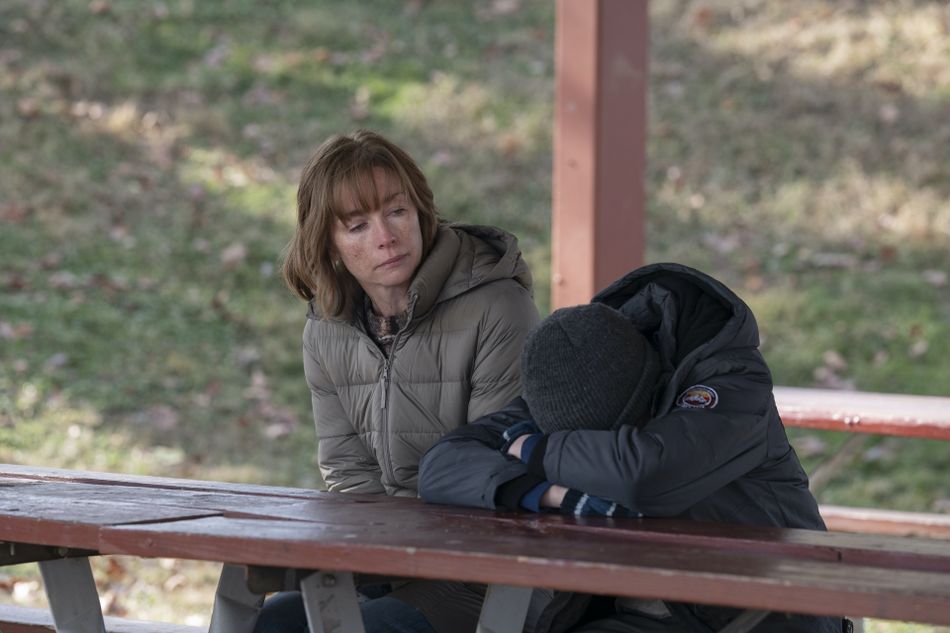Welcome to Fix It, our series examining projects we love — save for one tiny change we wish we could make.
Mare of Easttown was dark enough without all those ridiculous fake-outs, right?
Watching this series in a hyper-condensed format and against a backdrop of intense hype made its flaws stick way out.
From April to May, HBO’s seven-part limited series offered viewers a methodically paced crime thriller set in very moody, very gray, suburban Pennsylvania. A limited but dedicated fanbase tuned in week-to-week for new clues in this slow-burn whodunnit, lauded as a hidden gem of spring TV.
But then, just as the finale neared, the rest of us caught wind, binged it all in a weekend or two, and turned Mare of Easttown into a venerable hit — when maybe it shouldn’t have been.
Don’t get me wrong: I really enjoyed the show. But watching this series all at once and against a backdrop of intense hype made its flaws stick way out. And one choice (well, three choices, actually) made me sour on the series in a big way.
I’m talking about Mare of Easttown’s‘ decision to repeatedly bait-and-switch audiences with implied horrors that go nowhere. It happens three times in the series, each instance more irksome than the last.
This bizarre sort of tragedy-baiting begins in episode 4, when a teenager seemingly goes to kill an infant with a pillow. At the last minute, however, the would-be killer puts down his fluffy weapon and gently picks up the baby. If you’ve seen the show, I’m guessing you know the moment well because it’s…weird.

Admit it: You were surprised when you found out John was an adulterer and not a straight-up child molester.
Image: hbo
Ostensibly, the chilling sequence was intended to underscore the darkly fascinating development of an evidently troubled character. Of course, that Dylan feels confused, angry, maybe even homicidal, makes narrative sense. His story arc consists of being accused of murder, getting shot by a grieving dad, and finding out his son — this baby, who he has been raising — isn’t actually his.
In other scenes, Dylan expresses that discomfort in excruciating detail to his parents. Actor Jack Mulhern does a good job portraying that emotional turmoil through dialogue, and the resulting moments of tension really work. After all, smoldering intensity is what Mare of Easttown does best.
For whatever reason, though, the series’ creators decided that a bizarre, nonverbal drama of infanticide was needed to drive home whatever point was lost on me. It’s a bothersome moment of less-than-tasteful storytelling that feels jarring in an otherwise polished episode.
It’s a bothersome moment of less-than-tasteful storytelling that feels jarring in an otherwise polished episode.
Still, watching it, I thought, “Fine. I don’t get it, but fine.” Sometimes you miss what creators are going for and that’s OK. But then, grisly switcheroos became a pattern.
In episode 5, we see father John and his 13-year-old son Ryan seated on the edge of a bed. Ryan’s mother, Lori, suddenly looks in, concerned. She starts to eavesdrop just in time to see her husband place his hand on Ryan’s knee and whisper something about keeping a secret.
A later scene, in which Lori cryptically asks Ryan, “Is he doing it again?” seems to confirm viewers’ nauseating suspicion: This poor kid is being sexually abused by his father. But no, it’s just another Mare of Easttown fake-out.
Turns out, Ryan actually caught John cheating on Lori again, and that’s what all the secrecy was about. (Well, that and some murder-y stuff we don’t need to get into here.) No justification for invoking imagery as deeply traumatic as incestuous pedophilia is provided. They just did that for…mood? Set dressing? What was it?

Aaaand, yep, the bathtub bit was just too far.
Image: hbo
Finally, in episode 6, the titular Mare’s grandson — a toddler — almost drowns in a bathtub when the young woman watching him accidentally falls asleep. Except, again, not really: He’s just holding his breath and she wakes up terrified, but relieved. The horrifying scene troubled plenty of viewers, myself included, partly because it seemed to come out of nowhere. This particular knife twist, which stands only to further a vaguely insensitive plot line about addiction, is just indefensibly dumb.
It’s not that I don’t appreciate all the soapy goodness that Mare of Easttown has to offer; I do. But these bits, these salacious danglers without purpose, feel like a betrayal of viewer trust. When I turn on a gritty crime drama, I know there will be elements that make me uncomfortable. I know there will be horrible events of violence, and that some of aspects of that might feel “too far.”
But in those moments, I’m trusting the creators to make a show I can defend watching. So weirdness like this? These unexplained allusions to child murder and sexual abuse in the name of, I don’t know, making an already dark series darker for just a few strange seconds? I’m not into it, and argue the show is better without it.
In reaching for more shock value, Mare of Easttown ultimately came up with less for me to praise. Scrape that nonsense out, and then it might live up to its glowing reputation.
Mare of Easttown is now streaming on HBO Max
